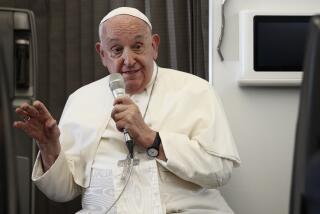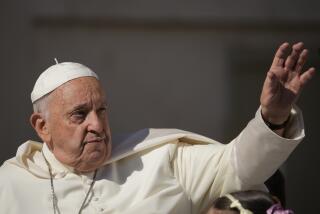The pope’s message
- Share via
Almost three decades ago, a new pope still in his 50s captivated Americans during a triumphant tour that took him to Washington, New York, Boston, Philadelphia, Chicago and Des Moines. Last week, America was visited by a different sort of pope -- a soft-spoken octogenarian -- with a less ambitious itinerary. But, like John Paul II’s 1979 tour, Benedict XVI’s visit to New York and Washington was a success beyond the opportunity it afforded the bishop of Rome to pray with the faithful.
The pope deserves credit both for what he said and for what he didn’t say. He repeatedly apologized for the widespread sexual abuse of young people by some Catholic clergy and the fact that the scandal was “sometimes very badly handled,” an oblique reference to bishops who shuffled predatory priests from one parish to another. He amplified that apology by meeting with a small group of victims from Boston, the epicenter of the scandal. Finally, unlike some conservatives, he refused to scapegoat gays, telling reporters: “I would not speak in this moment about homosexuality, but pedophilia, [which] is another thing.”
It was what the pope didn’t say that made news when he addressed Catholic educators at Catholic University in Washington. As predicted, Benedict stressed the importance of such institutions retaining their Catholic identity. But he disappointed conservatives who had hoped that he would read the riot act to colleges that welcome pro-choice politicians or allow the staging of “The Vagina Monologues.” Instead of descending to petty polemics, the pope eloquently insisted that “God’s desire to make himself known, and the innate desire of all human beings to know the truth, provide the context for human inquiry into the meaning of life.”
The pope’s visit also included interfaith encounters -- such as a visit to a synagogue -- as well as a poignant pilgrimage to ground zero in New York and an address to the U.N. General Assembly. In that speech, Benedict pleased supporters of the world organization (and perhaps irked the Bush administration) by endorsing Pope John Paul II’s call for a “greater degree of international ordering,” or common rules. He also suggested that the U.N. encourage not only discourse among nations but “inter-religious dialogue.” At a time when too many terrorists see themselves as waging “holy war,” it is an idea that other religious leaders should embrace.
More to Read
Sign up for Essential California
The most important California stories and recommendations in your inbox every morning.
You may occasionally receive promotional content from the Los Angeles Times.










